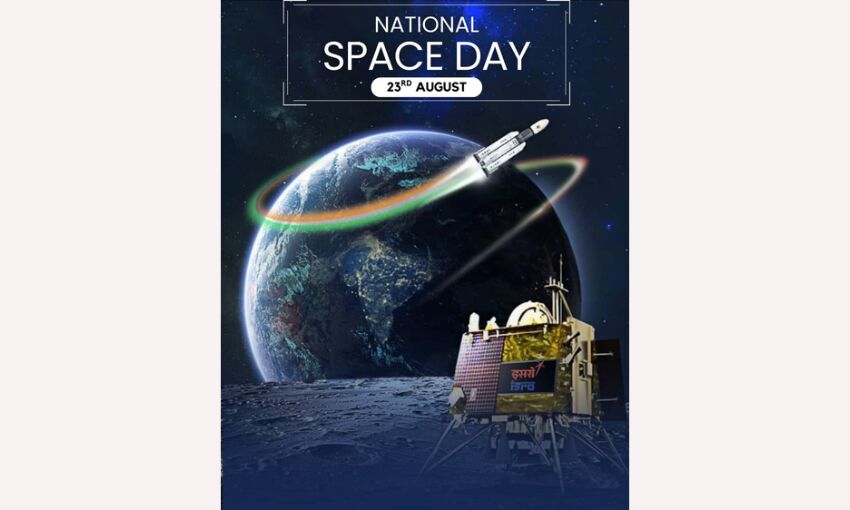Top Stories
India Celebrates National Space Day, Honoring Chandrayaan-3 Success

India commemorated its second National Space Day on August 23, 2023, with heartfelt tributes from political leaders across the nation. This day marks the historic landing of the Chandrayaan-3 mission on the Moon’s South Pole, a significant achievement that has elevated India’s status in global space exploration.
Leading the acknowledgments, Union Home Minister Amit Shah expressed his pride through a message on X, stating, “On #NationalSpaceDay, as we celebrate the historic moment when Chandrayaan-3 touched down on the Moon’s South Pole, every Indian heart swells with pride.” Shah praised the diligence of the scientists at the Indian Space Research Organisation (ISRO), attributing the success to their unwavering commitment. He highlighted the visionary leadership of Prime Minister Narendra Modi, asserting, “Under the visionary leadership of Modi Ji, this landmark mission has opened new frontiers in space exploration.”
Other leaders joined in the celebration. Union Minister Kiren Rijiju remarked, “Let #NationalSpaceDay be a reminder to us that no dream is too high when backed by courage & conviction.” In a similar vein, Uttar Pradesh Chief Minister Yogi Adityanath acknowledged the significant achievement, stating that the scientists had made an indelible mark in global space history.
National Space Day: Honoring Achievements and Future Aspirations
National Space Day was first established by Prime Minister Modi in 2024 and is celebrated annually to honor the success of Chandrayaan-3’s Vikram lander and Pragyan rover. These missions marked India’s entry into an elite group of countries capable of lunar exploration. The day serves as a national tribute to ISRO’s scientific accomplishments and aims to inspire the next generation of innovators.
In educational initiatives linked to this celebration, the NCERT announced the introduction of a new module titled “India – A Rising Space Power” in classrooms across Uttar Pradesh. This educational module is designed to highlight India’s journey in space science, showcasing key missions such as Chandrayaan, Mangalyaan, and the upcoming Gaganyaan mission.
Digital platforms like DIKSHA, NISHTHA, and the India on the Moon portal are being integrated into this year’s celebrations. These resources aim to provide accessible and high-quality content related to space science and innovation.
This year’s theme for National Space Day, “Aryabhatta to Gaganyaan: Ancient Wisdom to Infinite Possibilities,” encapsulates India’s rich scientific heritage. It draws connections between the ancient astronomical insights of scholars such as Aryabhatta and the cutting-edge advancements of modern Indian space missions. This theme emphasizes the continuity of knowledge and innovation that characterizes India’s approach to space exploration.
By recognizing the achievements of the past and the potential of the future, National Space Day serves not only as a celebration of scientific advancements but also as a source of inspiration for young minds across India. As the country continues to explore the cosmos, it carries the aspirations of a rising nation into the vast expanse of space.
-

 World4 months ago
World4 months agoSBI Announces QIP Floor Price at ₹811.05 Per Share
-

 Lifestyle4 months ago
Lifestyle4 months agoCept Unveils ₹3.1 Crore Urban Mobility Plan for Sustainable Growth
-

 Science3 months ago
Science3 months agoNew Blood Group Discovered in South Indian Woman at Rotary Centre
-

 Sports3 months ago
Sports3 months agoBroad Advocates for Bowling Change Ahead of Final Test Against India
-

 World4 months ago
World4 months agoTorrential Rains Cause Flash Flooding in New York and New Jersey
-

 Top Stories4 months ago
Top Stories4 months agoKonkani Cultural Organisation to Host Pearl Jubilee in Abu Dhabi
-

 Science4 months ago
Science4 months agoNothing Headphone 1 Review: A Bold Contender in Audio Design
-

 Top Stories4 months ago
Top Stories4 months agoAir India Crash Investigation Highlights Boeing Fuel Switch Concerns
-

 Sports3 months ago
Sports3 months agoCristian Totti Retires at 19: Pressure of Fame Takes Toll
-

 Business4 months ago
Business4 months agoIndian Stock Market Rebounds: Sensex and Nifty Rise After Four-Day Decline
-

 Politics4 months ago
Politics4 months agoAbandoned Doberman Finds New Home After Journey to Prague
-

 Top Stories4 months ago
Top Stories4 months agoPatna Bank Manager Abhishek Varun Found Dead in Well









